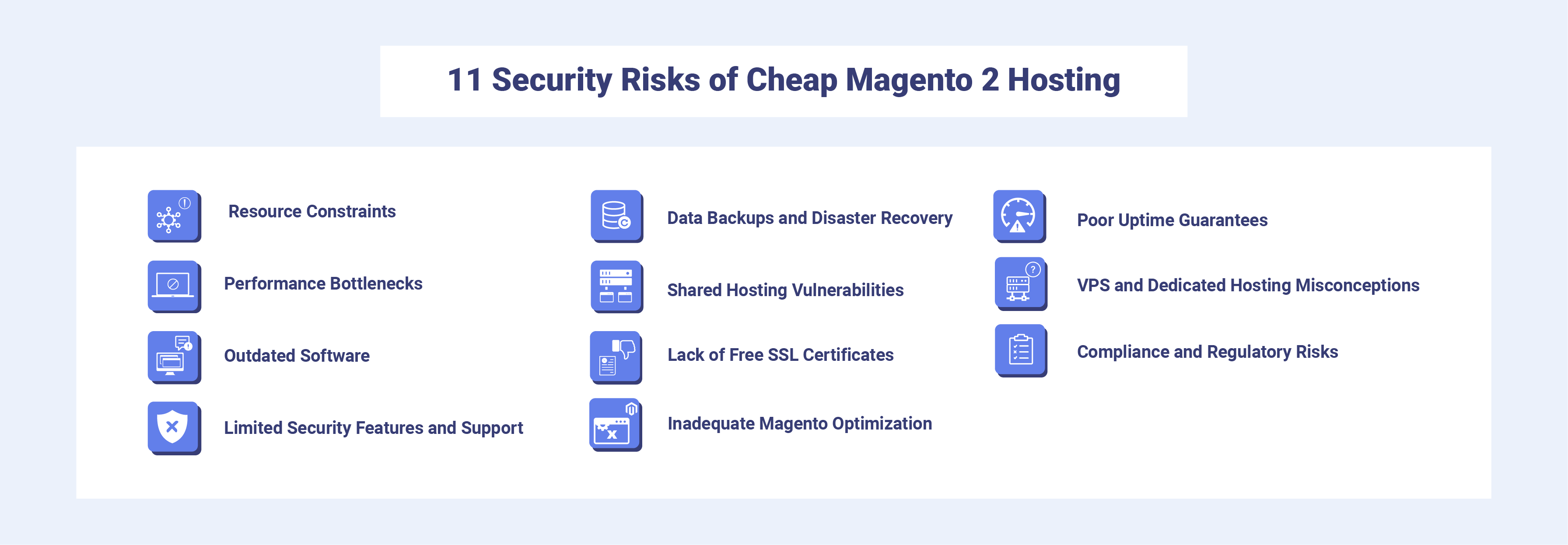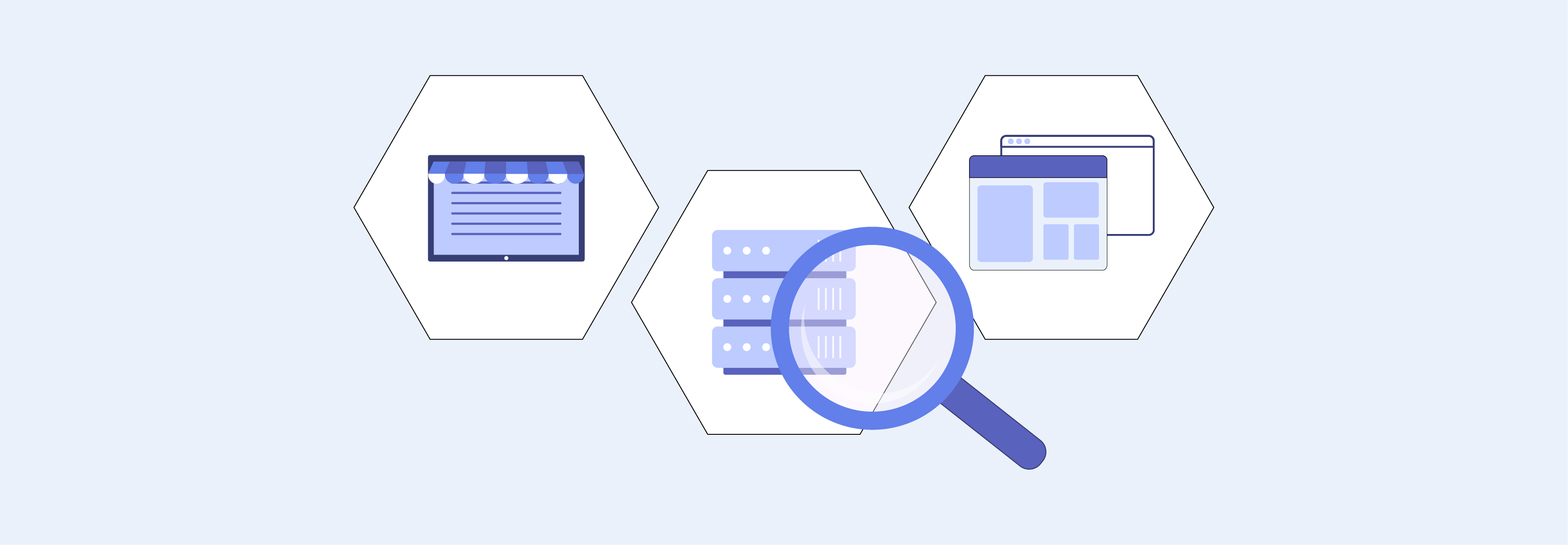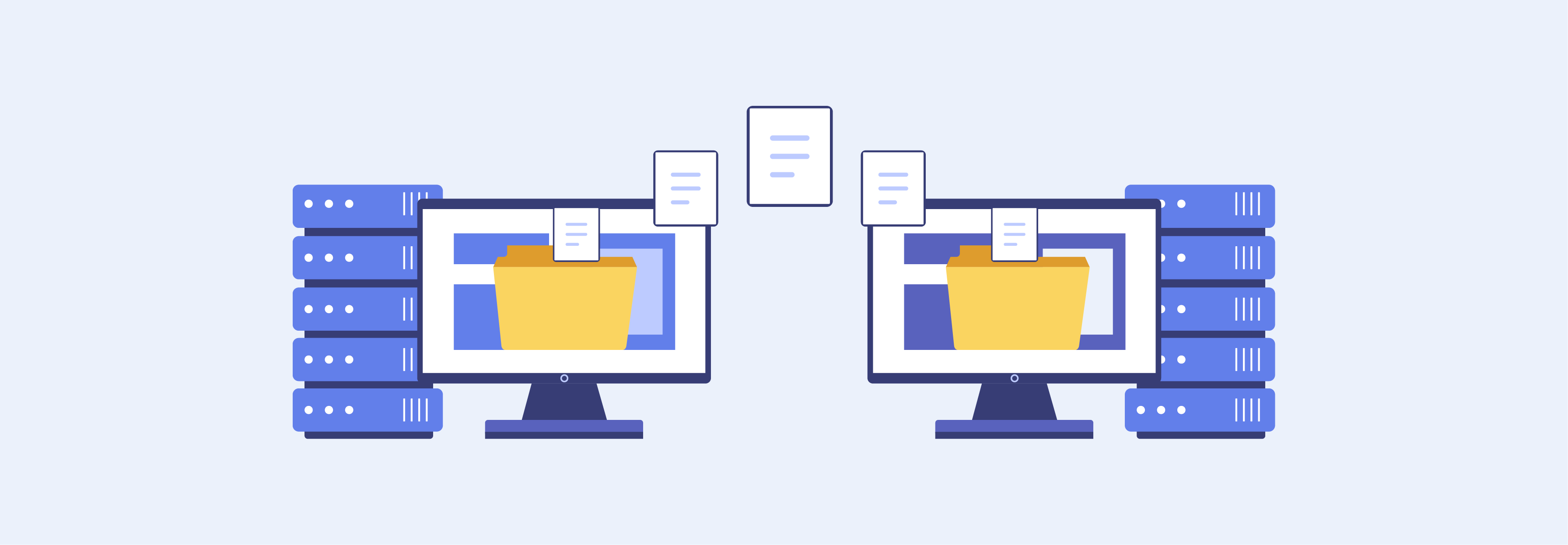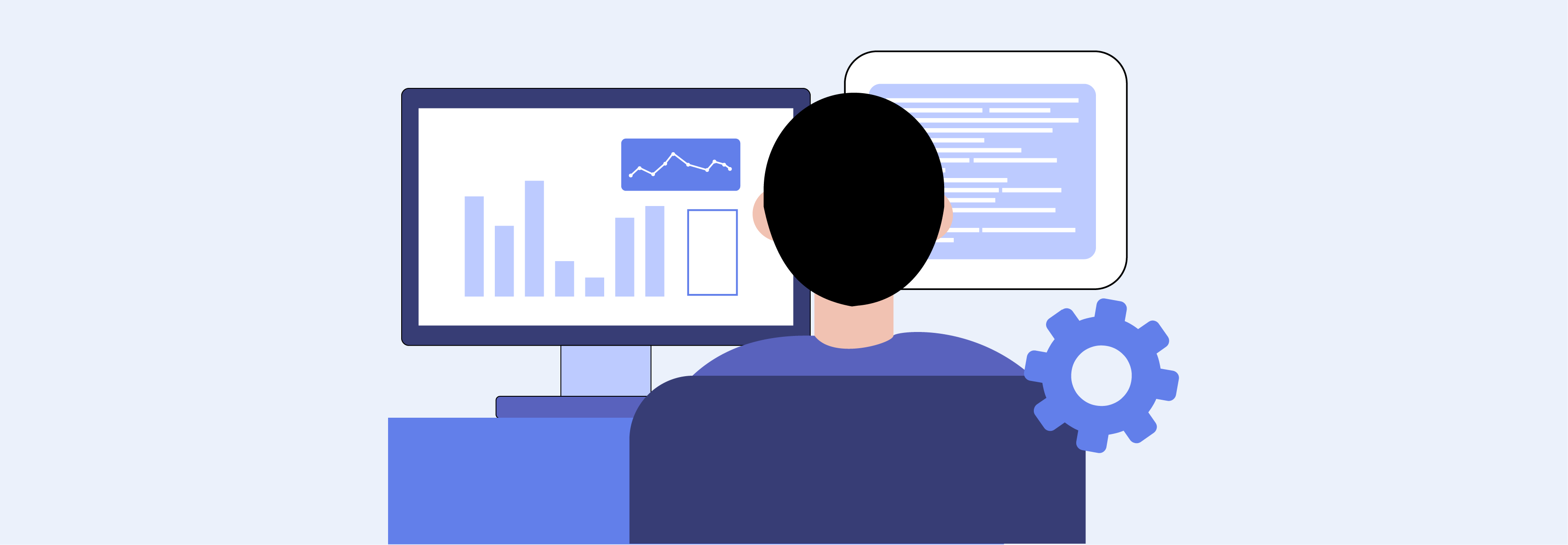
Security Risks In Cheapest Magento 2 Hosting Provider
Is your Magento 2 store in safe hands with the cheapest Magento 2 hosting provider? Selecting a hosting plan based solely on cost can expose your Magento ecommerce site to significant security risks. This article explores the unseen security risks and outlines key practices for ensuring safety with low-cost hosting solutions.
Key Takeaways
-
Discover the 11 security risks with opting for the cheapest Magento 2 hosting provider.
-
Learn how to assess the true cost to determine the genuine expenses of cheap Magento 2 hosting.
-
Explore best security practices when stuck with the cheapest Magento 2 hosting provider.
-
Understand the impact on Magento performance, impacting your store's speed, scalability, and overall performance.
-
Evaluate compliance risks with cheap hosting for your Magento store handling sensitive customer data and payment information.
11 Security Risks of Cheap Magento 2 Hosting

1. Resource Constraints
Affordable hosting plans often imply shared resources among multiple users. This setup can lead to resource constraints, affecting the performance and security of your Magento store. Limited bandwidth, storage, and processing power can hinder your site's ability to handle Magento traffic spikes and secure transactions. Such limitations make your site vulnerable not only to performance issues but also to potential security breaches.
2. Performance Bottlenecks
The allure of cheaper hosting can come with the cost of slower website performance. For a Magento ecommerce site, speed and responsiveness are critical for retaining visitors and converting sales. Slow loading times negatively impact user experience and can lower your site’s ranking in search engine results. It affects your store's visibility and customer trust.
3. Outdated Software
Budget hosting providers may not prioritize keeping their software up to date. This negligence exposes your Magento site to security vulnerabilities known in older versions of web servers, PHP, or database systems.
Hackers can exploit these weaknesses, leading to unauthorized access or service disruption. It puts your data and customer information at risk.
4. Limited Security Features and Support
Cheaper Magento hosting plans often come with basic or limited security features. Essential protections like web application firewalls (WAF), intrusion detection systems (IDS), and regular security patching are absent. These omissions expose your Magento site to various threats. Customer support in budget hosting is also less responsive, potentially leaving your site vulnerable for longer periods during a security incident.
5. Data Backups and Disaster Recovery
Reliable data backup and disaster recovery solutions ensure business continuity in the face of data breaches or system failures. Low-cost hosting providers offer infrequent backups or charge extra for backup services, risking significant data loss in the event of a breach or failure.
Restoring your Magento site to its pre-attack state without regular, comprehensive Magento backups becomes complex and time-consuming. It can lead to extended downtime, lost revenue, and decreased customer trust. Effective disaster recovery plans safeguard your online presence and maintain the integrity of your customer data.
6. Shared Hosting Vulnerabilities
Opting for shared hosting—a common feature among the cheapest hosting solutions—means your Magento site shares a server with other websites. If one site on the server is compromised, it can endanger your store.
Attackers often exploit a compromised website as a springboard, using shared server vulnerabilities to infiltrate other sites hosted alongside it. This domino effect can lead to unauthorized access, data theft, or even the spread of malware from one compromised site to yours.
7. Lack of Free SSL Certificates
Secure Sockets Layer (SSL) certificates safeguard data exchange integrity and confidentiality between a user’s browser and your Magento site. While many reputable hosting providers offer free SSL certificates, cheaper options might not.
Without SSL encryption, data transmitted to and from your site can be intercepted. It compromises sensitive customer information such as login credentials and payment details. The absence of SSL elevates the risk of data breaches and deters customers from making purchases, knowing their data might not be secure.
8. Inadequate Magento Optimization
Magento is a resource-intensive application requiring specialized hosting solutions for optimal performance. Budget providers may lack the necessary optimization for Magento, affecting site speed, scalability, and security.
Subpar performance can frustrate users, leading to increased Magento bounce rates and decreased sales. It also leaves your site vulnerable to attacks, compromising user data and your business's reputation.
9. Poor Uptime Guarantees
Magento downtime directly impacts your ability to generate revenue and maintain customer trust. Cheap hosting plans often provide less uptime guarantees, translating into more frequent and possibly extended periods of inaccessibility.
This instability can frustrate customers and drive them to competitor sites, resulting in lost sales.
10. VPS and Dedicated Hosting Misconceptions
VPS (Virtual Private Server) and dedicated hosting options offer more resources and control. Opting for budget-friendly VPS or dedicated plans does not automatically ensure these setups are optimized for Magento's unique requirements. They are also not equipped with the necessary security measures.
Carefully evaluating the security features and performance capabilities of these hosting options is essential to ensure they align with the needs of your Magento store.
11. Compliance and Regulatory Risks
Compliance with regulations like GDPR or PCI DSS is non-negotiable for Magento stores handling sensitive customer data and payment information. Cheapest hosting solutions may not provide the necessary tools or configurations to meet these regulatory requirements.
It exposes your business to significant financial penalties and legal challenges. Ensuring your hosting solution supports compliance efforts to maintain your business's credibility and legal standing.
Find the True Cost of Cheap Magento 2 Hosting
1. Analyze Resource Allocation

-
Investigate Server Specifications: Determine the CPU cores, RAM allocation, and storage space included in the hosting plan. Assess whether the hosting plan offers adequate resources to handle your store's operations. It involves a detailed comparison of the hosting plan's specifications against the needs of your Magento store. Factor in the number of products, the complexity of your store's features, and the expected traffic volume. High-resolution images, extensive Magento catalogs, and peak traffic times demand significant resources to ensure smooth, uninterrupted service.
-
Research Industry Benchmarks: To make an informed decision, it's advisable to consult industry benchmarks regarding Magento 2 stores. These benchmarks provide a baseline for the necessary server specifications to run a Magento 2 store efficiently. Resources such as Magento's official documentation, ecommerce platforms, and forums offer insights into typical resource needs. It helps you set realistic expectations for Magento hosting performance.
-
Understand Shared Hosting Limitations: Acknowledge that economic plans often utilize shared resources. Investigating the number of sites typically hosted on the same server and the provider's policies for resource allocation can reveal potential bottlenecks. Understanding these limitations allows for strategic planning. It includes opting for off-peak hours for resource-intensive tasks. It also helps you prepare for possible upgrades in anticipation of traffic increases.
2. Evaluate Security Features and Support

-
Scrutinize Security Measures: Check if the hosting plan includes essential security features like firewalls, IDS, and DDoS protection. Understand the provider's policy on security updates for Magento 2 and server software. This level of scrutiny helps mitigate risks that could compromise your Magento store's integrity and the safety of customer data.
-
Assess Customer Support: When assessing Magento customer support, consider the variety of support channels offered (such as phone, email, and live chat) and their availability. 24/7 support is particularly important for ecommerce stores, as issues can arise outside of standard business hours. Furthermore, investigate the provider's response times and track record for resolving issues. Specifically, the support team's expertise in Magento 2 and familiarity with common security challenges.
3. Investigate Backup and Disaster Recovery
-
Backup Options: Look into the backup frequency and methods (automatic vs. manual) offered. Automatic backups should occur at a frequency that aligns with your store's update cycle and transaction volume. While offering control over the timing, manual backup options require a disciplined approach to ensure consistency. Ensure backups are stored off-site as it protects against data loss from physical damage to the hosting provider's primary data center. Additionally, understanding any limitations on backup storage space helps plan for Magento scalability. It also helps avoid unexpected costs as your store grows.
-
Disaster Recovery Plan: Find out if the provider has a formal disaster recovery plan. It should outline specific procedures for responding to various types of outages. Whether caused by technical failures, cyberattacks, or natural disasters. Key components to look for include the provider's steps to restore services, the recovery time objectives (RTOs), and any expected downtime. A detailed and actionable disaster recovery plan minimizes downtime and provides a clear roadmap for navigating crises.
4. Factor in Potential Downtime Costs

-
Estimate Downtime Impact: Research the average cost of downtime per hour for eCommerce sites to provide a baseline for understanding the direct impact on revenue. However, the indirect costs, such as customer dissatisfaction and loyalty, can be even more significant. Downtime during peak shopping periods or promotional campaigns can exponentially increase these costs. Therefore, calculate the potential impact of website downtime on your business model and customer base to assess a hosting plan's true cost.
-
Evaluate Security Breach Costs: Consider the financial impact of data breaches. It includes customer churn, reputational damage, and potential fines for failing to protect customer data. Evaluate the hosting provider's security measures and track record in managing breaches.
5. Compare TCO of Different Options
-
Calculate Hosting Costs: Account for the monthly fee, setup charges, and any additional costs for security features. It includes SSL certificates, advanced firewall protection, intrusion detection systems, and more. Accumulating these costs clarifies the financial commitment required to maintain a secure and efficient hosting setup for your Magento 2 store.
-
Factor in Hidden Costs: Include potential revenue losses from downtime, which can vary depending on the nature and timing of the outage. Costs associated with data breaches should also be considered, encompassing immediate financial impacts and longer-term costs. It includes customer trust repair, legal fees, and compliance penalties. Furthermore, add the Magento cost needed for additional security measures beyond what your hosting provider includes. It includes third-party monitoring services or custom security solutions.
-
Compare TCO with Alternatives: Investigate managed Magento 2 hosting or cloud-based solutions. Over time, these solutions can lead to cost savings through improved site performance, higher conversion rates, and reduced incidence of costly security breaches. Evaluating the TCO of these alternatives in the context of their benefits allows for an informed comparison. It highlights the potential for long-term savings and value that offset the initial expense.
6. Assess Scalability and Growth Potential

-
Growth Readiness: Evaluate if the hosting solution can scale with your business without significant performance degradation or additional unexpected costs. This assessment should account for the potential need for additional resources, such as CPU, RAM, and storage.
-
Upgrade Path: Investigate the ease and cost of upgrading your hosting plan. Review the cost structure of higher-tier plans to ensure they remain cost-effective as you scale. Some hosting providers offer graduated plans that incrementally increase resources and capabilities. Others may have significant jumps in both performance and price. Understanding these options beforehand allows for more strategic planning and budgeting. Ensure your hosting solution aligns with your business's growth trajectory and ecommerce objectives.
Best Security Practices if Stuck with the Cheapest Magento 2 Hosting Provider
1. Migrate to another hosting provider

Consider migrating your Magento 2 store to a more secure and reliable Magento hosting solution. Research and select a hosting provider known for robust security measures and Magento optimization, such as MGT Commerce, Nexcess, or A2 Hosting. These providers offer specialized Magento hosting plans with enhanced security features and support.
2. Focus on Software Updates
-
Maintain Magento 2 Core and Extensions: Regularly update your Magento 2 core software and all installed Magento extensions to the latest versions. These updates often contain critical security patches that address known vulnerabilities.
-
Automate Updates: Where possible, enable automatic updates or set a schedule that ensures your store remains up to date. This practice minimizes the window of opportunity for attackers to exploit vulnerabilities.
3. Strengthen Passwords and Access Control
-
Enforce Strong Password Policies: Require all users, including admin accounts and customers, to create strong, unique passwords. Utilize password managers to help manage these credentials securely.
-
Implement Two-Factor Authentication (2FA): Adding Magento 2FA provides a layer of security for user logins, significantly reducing the risk of unauthorized access.
-
Restrict Admin Access: Limit Magento backend access to essential personnel only. Further, tailor access levels based on individual roles to minimize potential internal security risks.
4. Security Scans and Monitoring

-
Utilize Security Scanning Tools: Use free or low-cost security tools to scan your Magento 2 site for vulnerabilities regularly. Tools like Magento's own Security Scan Tool can provide valuable insights.
-
Invest in Monitoring Services: Consider budgeting for advanced monitoring services that offer real-time alerts and comprehensive scans. Early detection of issues can prevent security breaches.
5. Backup Religiously
-
Establish a Backup Routine: Implement a rigorous backup schedule to protect your data. Ensure backups are performed frequently, depending on your store's activity level.
-
Explore Third-Party Backup Solutions: Investigate affordable, reliable third-party services that offer off-site backup storage. Regular testing of backup integrity and recovery processes is essential to ensure they are effective in emergencies.
6. Stay Informed and Proactive

-
Subscribe to Security Advisories: Keep updated on the latest security advisories from Magento and reputable security forums. Being informed enables you to react swiftly to emerging threats.
-
Educate Yourself on Best Practices: Continuously seek information on the latest security best practices for Magento 2. Implementing these practices can significantly mitigate risks.
FAQs
1. What are the characteristics of the best Magento hosting providers?
The best Magento hosting providers offer various hosting types like cloud hosting, VPS hosting, and dedicated servers. They ensure a secure environment for Magento with features like web hosting plans, shared hosting plans, and dedicated teams.
2. Is fully managed hosting for Magento available?
Yes, fully managed hosting services for Magento are offered by reputable hosting companies. These services include control over your hosting environment. They ensure optimal hosting configuration for Magento and provide a dedicated team to handle technical aspects.
3. What hosting options are suitable for Magento 2 websites?
Magento 2 websites benefit from various hosting options such as cloud hosting, VPS hosting, and dedicated servers. Each hosting type caters to different needs, offering scalability, security, and control over your hosting environment.
4. Are there free Magento hosting services available?
While some hosting providers offer free Magento hosting, it's essential to evaluate the hosting plan comprehensively. Free plans may lack certain features, and it's important to consider the overall hosting solution, including hosting offers, before making a decision.
5. How does Magento cloud hosting contribute to security?
Magento cloud hosting provides a secure environment through hosting services like Amazon Web Services. It ensures a reliable hosting solution for large Magento ecommerce sites, offering benefits like per month payment options. It also includes control over your hosting environment and advanced security features.
6. What makes a hosting provider the best choice for Magento 2?
The best hosting provider for Magento 2 offers a hosting solution that aligns with the unique requirements of Magento. It includes providing a web hosting plan tailored for Magento, offering control over your hosting environment, and implementing the necessary security measures.
7. Why is shared hosting considered the cheapest option?
Shared hosting is often a cheap hosting option as it involves multiple websites sharing the same server. While cost-effective, it may pose security risks due to shared server vulnerabilities. Evaluating hosting companies for shared hosting plans is essential to balance affordability and security.
Summary
The cheapest Magento 2 hosting providers include potential security risks. Shared resources, performance bottlenecks, and outdated software can compromise your Magento store's integrity.
The article extensively explored the 11 security risks of opting for the cheapest Magento 2 hosting provider. Explore reliable Magento server hosting solutions that prioritize security, ensuring a robust and secure online presence for your ecommerce business.



